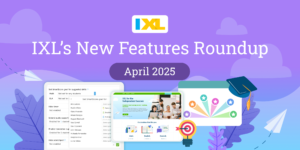At IXL, we never stop adding new features and skills to our award-winning teaching and learning platform, so you can always trust we’re on pace with students’ evolving needs. That’s why we compile a list of our top new features to help you—as a learner, educator, or parent—get the most out of IXL.
Keep reading below for a roundup of releases from April, including SmartScore Goals, IXL for adult independent learners, Spanish math games, and more! To stay current with our latest updates, follow IXL on Facebook, Instagram, X, and LinkedIn.
Table of contents:
Major releases
SmartScore Goals for suggested skills
Teachers can now set SmartScore goals for their suggested skills in math, ELA, and Spanish! This is an easy way for teachers to convey their expectations to students and tailor IXL skill practice to their needs.
On their Profile & Settings page, teachers will be able to set a SmartScore goal of 80 (proficiency), 90 (excellence), or 100 (mastery) for students at the roster, class, and individual student level. Students will see their goal above their SmartScore while working on a suggested skill to track their own progress.
When they reach their goal, students will receive a congratulatory message to applaud their hard work, and the skill will move into the “completed” section of their dashboard. Teachers will also be able to easily track whether students have met their SmartScore goals from the Score Grid report.
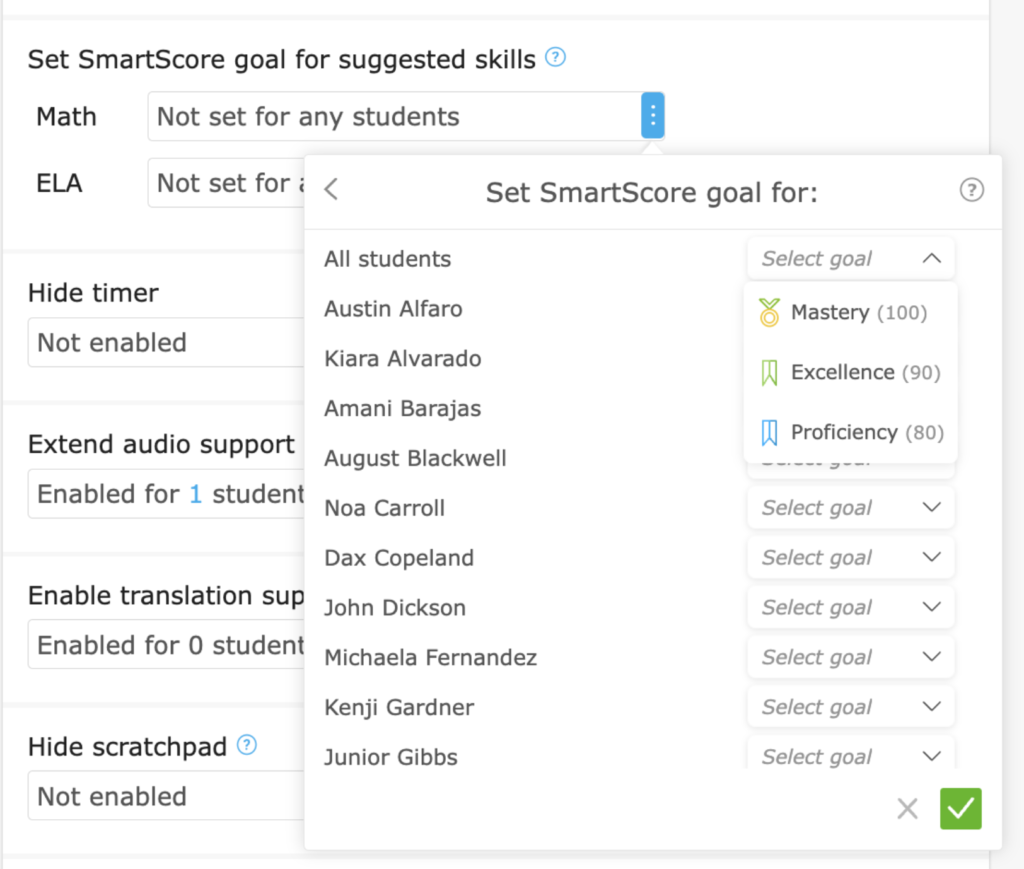
IXL for Independent Learners
We have a new version of IXL built specifically for adult independent learners—IXL for Independent Learners! Whether you’re looking for a career transition, preparing for college courses, or brushing up on your language skills, IXL is here to support you on your learning journey.
IXL for Independent Learners comes with math, English, and Spanish content organized by more general levels rather than grades. It also has skill plans for important exams such as the GED, HiSET Exam, and the SAT, with more plans coming!
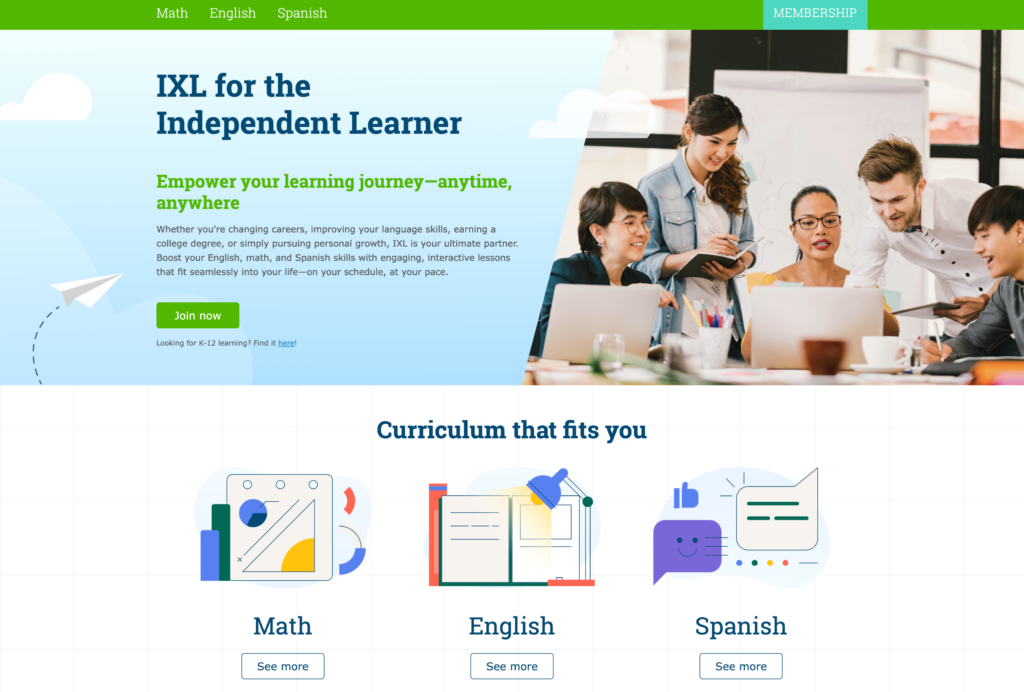
Spanish math games
We’ve released Spanish versions for many of our IXL math games! Now Spanish-speaking students can play and learn math in their own language.
To access math games in Spanish, select the “Espanol” option on the grade or game landing page. For games in which a Spanish version is available, you can also switch to the Spanish version on the game page.
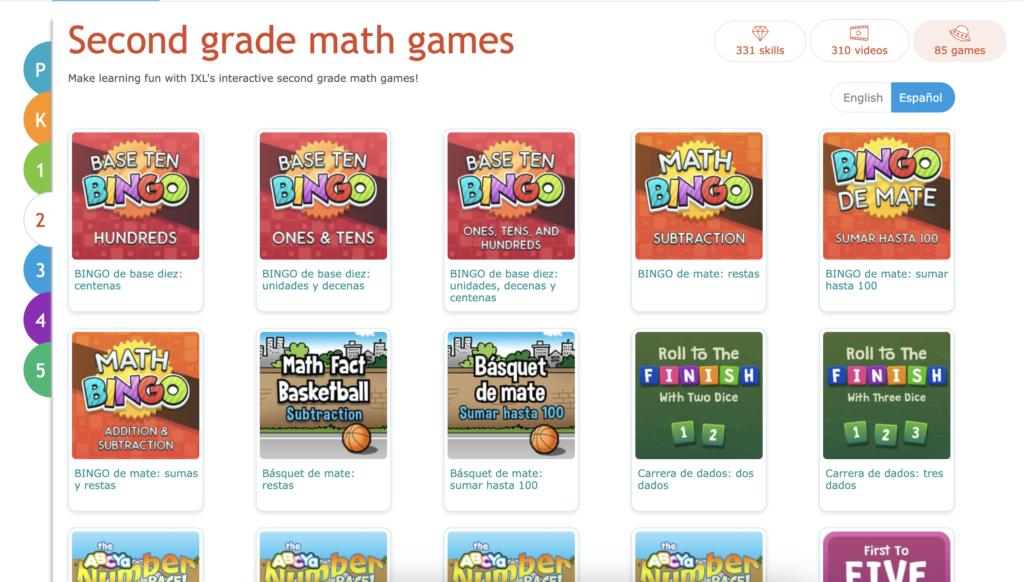
Ultimate Summer Workbooks
Beat the summer slide with IXL’s new Ultimate Summer Workbooks! Available for rising 2nd through 4th grade students, these workbooks cover key topics across math, English language arts, science, and social studies.
Created by IXL’s education experts, these workbooks offer learners a premium summer learning experience packed with colorful and whimsical illustrations, thoughtfully crafted questions, and a variety of hands-on activities designed to keep learners engaged. They also provide straightforward guidance for structuring summer learning, with each workbook divided into daily activities that last for 12 weeks of five days.
For IXLers who want the full IXL experience, each Ultimate Summer Workbook connects seamlessly with an IXL online membership. Look for the skill ID on each workbook page and head to IXL.com or the mobile app to dive into more questions, instant feedback, and a personalized action plan that shows the best next steps for growth!
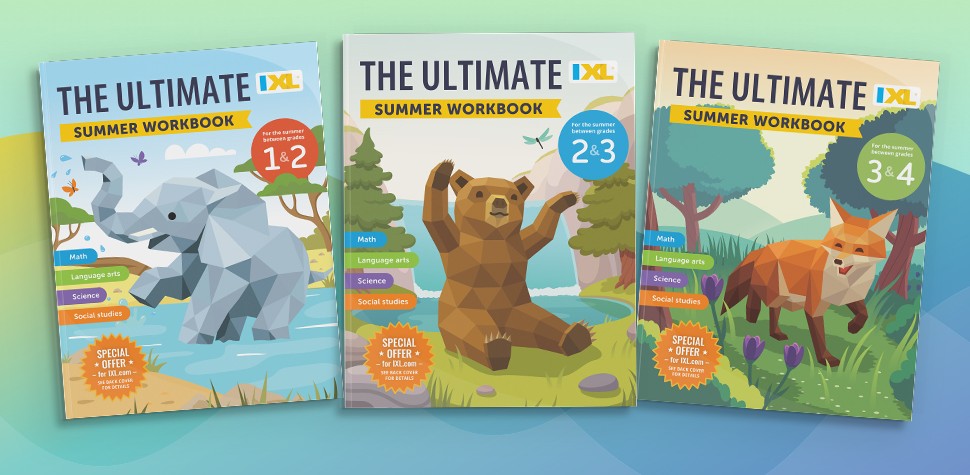
Feature updates
IXL Assessment Suite in Learning Management Systems
The full IXL Assessment Suite is now supported in Canvas, Schoology, Google Classroom, and Brightspace! Admins and teachers can now assign IXL assessments through these LMSs in both Benchmark and Real-Time modes, giving them more flexibility in how they use IXL.
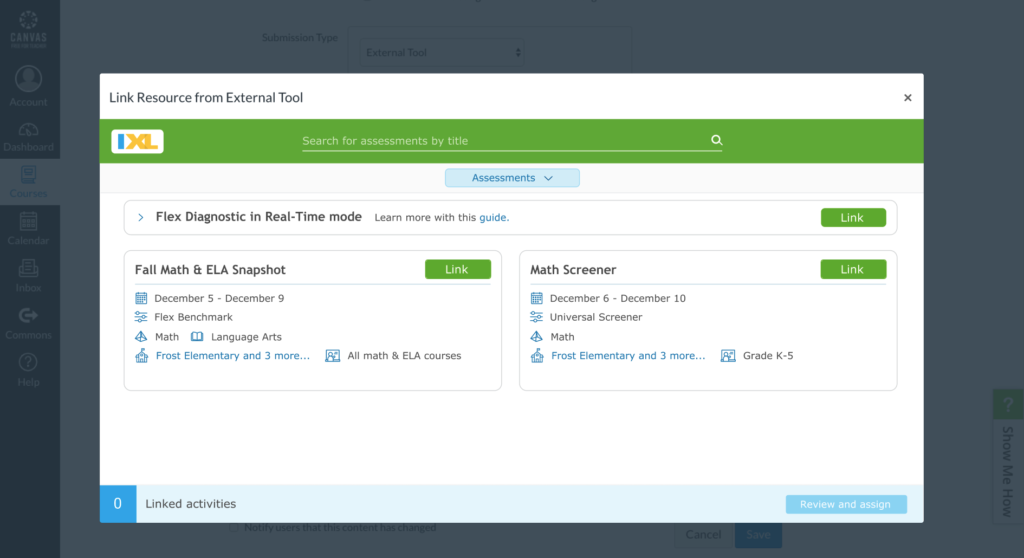
Teacher-submitted IXL Quizzes in Quiz Library
Teachers can now share their IXL Quizzes with school administrators to add them to the Quiz Library! This makes it fast and easy for teachers to share resources, enabling closer collaboration on assessments for teachers, admins, and instructional coaches.
Teachers can send their active, past, and draft quizzes to school administrators for review. Administrators can then approve these quizzes and add them to the school’s Quiz Library as quiz resources that all teachers at the school can access.
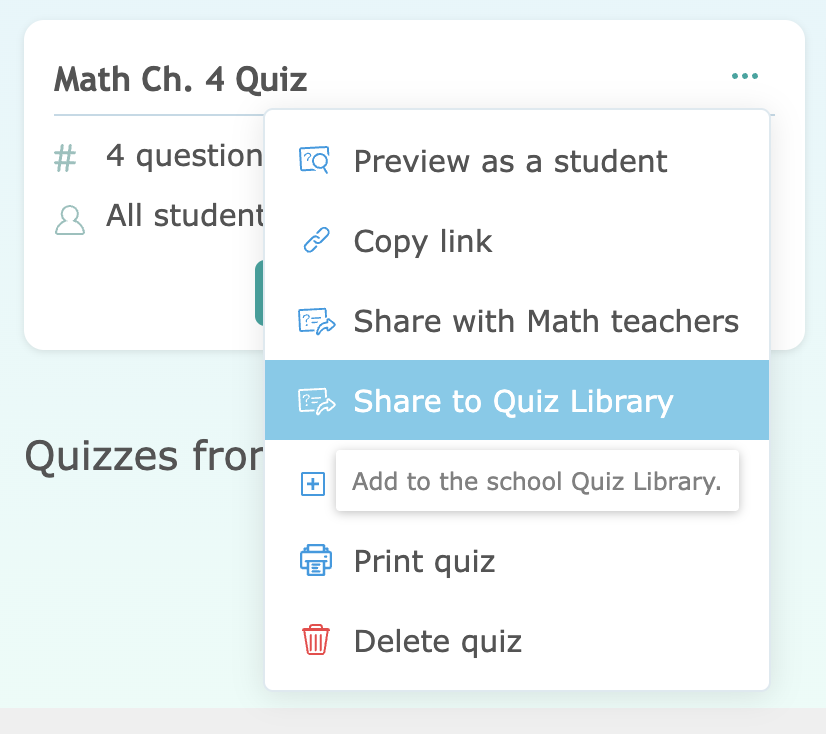
IXL LevelUp™ Diagnostic standards report for ND, SC, and WV
Teachers in Alabama and Minnesota now have custom-built standards reports for Benchmark mode of the LevelUp Diagnostic aligned to their state standards! With this release, the LevelUp Assessment Standards Performance report is available in 49 states.
With the standards report, teachers can track their students’ knowledge of state math standards based on their scores from the LevelUp Diagnostic.
Stay tuned as we continue to release additional state standards reports in the coming months.
Calculator for iPhone and iPad apps
Students can now use IXL’s in-assessment calculator in the IXL iPad and iPhone apps. When working on select middle- and high-school-level diagnostic questions that offer calculator support, students can open the calculator by tapping the icon in the bottom-right corner of their screen. Depending on the question, students will see either a four-function calculator or a scientific calculator.
The in-assessment calculator helps students stay focused on their work while better preparing them for state tests.
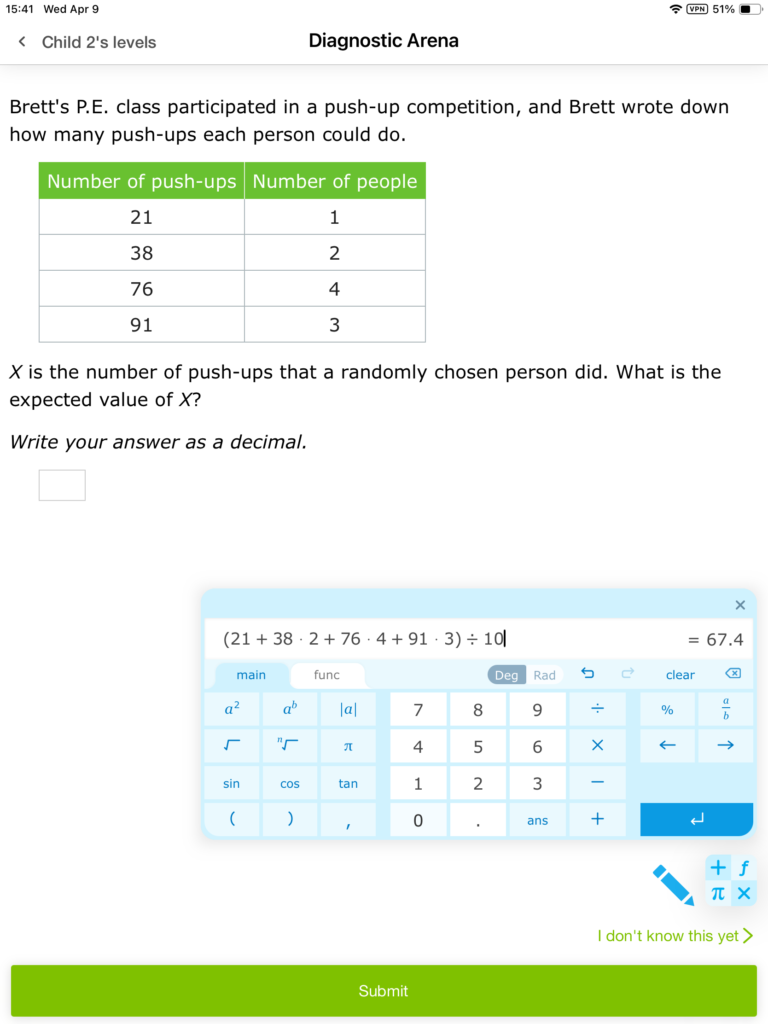
Student demographic data for all IXL editions
Administrators are now able to filter, group, and sort student demographic data in analytics reports across all editions of IXL, not just the U.S. edition! Demographic data can include race, gender, ethnicity, ELL status, IEP status, free & reduced lunch (FRL) status, and home language, if the district chooses to share these data points with IXL.
Admins can enable this feature and share their desired demographic data through existing IXL rostering methods. Administrators can also define and use custom fields, which allows them to have full control and insight into key demographic information within their district.
Skill plan updates and new skills
New math skills
We’ve released over a dozen new math skills, from kindergarten to Calculus:
- Should you measure size, weight, or capacity? (Kindergarten)
- Describe solid shapes (Kindergarten)
- Make picture graphs with symbols (Grade 1)
- Ways to make a number – tens and ones (Grade 1)
- Show data in different ways (Grade 1)
- Attributes of two-dimensional shapes (Grade 1)
- Name the three-dimensional shape and explain your answer (Grade 1)
- Find the start time: word problems (Grade 3)
- Divide using number lines (Grade 3)
- Identify multiplication patterns in tables (Grade 3)
- Comparison word problems with multiplication and division: larger numbers (Grade 4)
- Divide larger numbers by 1-digit numbers: comparison word problems (Grade 4)
- Sides and angles in polygons (Grade 4)
- Add and subtract fractions and mixed numbers: multi-step word problems (Grade 5)
- Multiply fractions greater than one using models (Grade 5)
- Identify the graph of a function from the graph of its derivative (Calculus)
New ELA skills
We’ve released a handful of new ELA skills:
- We’ve added two decodable text skills for kindergarten and first grade, specifically designed for mastering the short ‘e’ sound. With these additions, we have a comprehensive set of short vowel decodable texts tailored for early learners. As always, these skills include delightful illustrations and engaging stories that make learning fun.
- We’ve released a new third-grade poetry skill aimed at helping students identify various types of poems. This skill features a delightful mix of limericks, haikus, rhymed verse, and free verse poems. This skill is a fun introduction into the world of poetry!
- Students who have finished our first Walden skill and are looking for more peaceful reflections at Walden Pond can dive into Analyze passages from Walden: Part 2. A variety of rigorous reading strategies questions guide students through important passages from the second half of Henry David Thoreau’s transcendental classic Walden.
New science skills
We’ve released a couple of new high school chemistry skills:
- In Factors that affect rate of reaction, students determine how factors like stirring, surface area, concentration, temperature, pressure, and the presence of catalysts affect reaction rates.
- In Calculations involving the pH of strong acids and bases, students use the logarithmic relationship of pH to hydronium ion concentration to determine the pH, hydronium ion concentration, or hydroxide ion concentration of an acidic or basic solution.
New social studies skills
We’ve added a new social studies skill for elementary school!
George Washington, available for grades 2 and 3, features engaging passages introducing students to the background and achievements of our nation’s first president.
New textbook skill plans
We’ve released skill plans for the following textbooks:
Math:
- Eureka Math^2 FL B.E.S.T. (Florida) (Grades K-5)
- IM v.360 (new edition of Illustrative Mathematics) (Grades 1-4, 6-8, Geo, Alg 2, Int 1)
- Precalculus: Mathematics for Calculus (7th Edition)
- Reveal Math (2025) (Courses 2-3 and Accelerated for grades 7 and 8)
ELA:
- Bluebonnet Learning (Texas) (Grades 3-5)
New standards skill plans
We’ve released skill plans for the following standards:
- Alabama Course of Study (adopted in 2023) (Science grades K-Chem)
- Colorado Extended Evidence Outcomes (EEOs) (Math and ELA high school courses)
We’ve also released high school U.S. history standards skill plans for 15 more states:
- Arkansas
- Delaware
- Idaho
- Iowa
- Kansas
- Maine
- Montana
- Nebraska
- Nevada
- New Hampshire
- New Mexico
- Rhode Island
- Utah
- Vermont
- West Virginia
These skill plans join the plans we already have for Alabama, Colorado, Connecticut, Indiana, Kentucky, Louisiana, Maryland, Massachusetts, Minnesota, Missouri, New Jersey, Oklahoma, Oregon, South Carolina, and Washington.
New test prep skill plans
We’ve released skill plans for the following assessments:
- Connecticut NGSS Science Assessment (Grades 5 and 8)
Summer Boost and Summer Adventures skill plans
IXL’s summer spotlight skill plans are back! We have two seasonal skill plans for summer, with each plan providing 20 days’ worth of skill recommendations:
- Summer Boost for math and ELA focuses on the most important skills from the previous year, to set students up for success in the fall. They are available for rising K-12 students.
- Summer Adventures is designed to keep students exploring fun new topics this summer. There’s one plan per grade for rising K-8 students, incorporating skills from math, ELA, science, and social studies.
Students should follow the plan that reflects their grade for the upcoming school year (e.g., rising third graders should use the third grade plan).
Additional releases
New math and ELA video tutorials
We’ve released 78 new math videos! These videos cover topics such as:
- One less – up to 10 (Kindergarten)
- Intermediate Value Theorem (Calculus)
Additionally, we’ve added Spanish subtitles to 111 more math videos. Like translated skills, translated subtitles are available to users with Spanish support enabled.
We’ve also released 15 new ELA videos in grades 3 through 5! The videos in this release cover topics such as:
- Identify elements of poetry (Grade 4)
- Identify main verbs and helping verbs (Grade 5)
For IXL Canada, we’ve added four new math video tutorials for grades 4 through 9!
Flashcard tool for Spark Studio
Spark Studio has a new interactive tool: Flashcards! The Flashcards tool generates a list of key terms and concepts based on any topic. From there, teachers can click “Launch flashcards” to create an immediately usable flashcard deck to practice these terms!
Once a deck is created, it’s publicly accessible via a shareable link, allowing teachers to share with students or fellow teachers.

Spanish support for all Takeoff by IXL units
We’ve released Spanish translation support for Takeoff Grade 1, Unit 13. This means that Spanish translation support is now available for all national Takeoff units in grades K-5!
These units now have Spanish translations available for the student workbook PDFs, independent practice PDFs, mid-unit check-ins, and unit tests. We’re thrilled to offer these resources to support teachers and help Spanish-speaking ELLs succeed in math.
Takeoff language support tips
Takeoff’s “Additional supports” tab now shows new notes to help teachers support language learners. These notes include strategies for working with beginning, intermediate, and advanced language learners, and are taken from research-backed best practices.
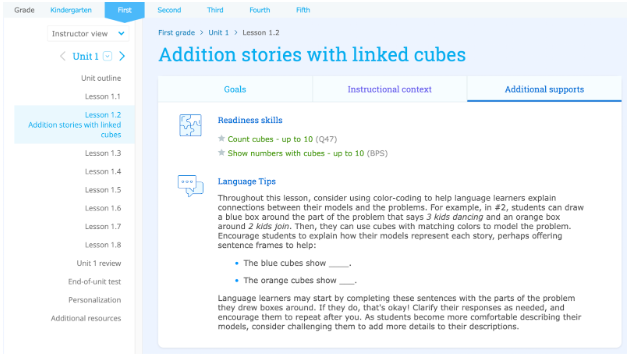
Takeoff California edition
We’ve launched our first state-specific version of Takeoff for California! Here’s what sets the California edition apart:
- Built around “big ideas”: California’s new math framework emphasizes organizing instruction around “big ideas”—clusters of related standards that support deep, meaningful learning. You’ll see these big ideas reflected throughout Takeoff, including on unit outline pages and grade-level overviews.
- Environmental Principles & Concepts activities: California requires all subjects to incorporate environmental learning. We’ve created 15 math activities per grade that highlight the connections between math and real-world environmental issues. These are woven throughout the year to help students explore how math can be a tool for understanding and solving the challenges we face.
- Performance tasks: Four performance tasks will be added across the personalization days in each grade. These tasks offer rich, higher-order thinking opportunities and can be used as standalone projects or alternate assessments. Each task integrates multiple topics students have already encountered, challenging them to synthesize ideas and apply their skills in real-world contexts.
The California edition of Takeoff will start off as opt-in only. Schools and districts that would like to use it can request to switch from the national version. This ensures that educators already using Takeoff can finish the school year without interruption.
Takeoff alignment to Georgia state standards
We have added alignments for Georgia’s K-12 Mathematics standards to our K-5 Takeoff curriculum. Georgia educators signed into a Takeoff account will see the Georgia standards in various places, such as on each grade level’s landing page and at the top of each unit and lesson.
